Grape Cultivation : This person made his grapes a brand, chose improved varieties
Muralidhar then approached the Bangalore-based Department of Agriculture, Marketing and Cooperation, Gandhi Krishi Vigyan Kendra.
Grapes are grown on about 40,000 hectares in India, which mainly includes the states of Maharashtra, Karnataka, Andhra Pradesh and Tamil Nadu. H. Muralidhar, a resident of Hosahudya village in rural district of Bengaluru, Karnataka, is earning a decent income from the use of modern technology in grape cultivation and selection of right varieties. He has a total of 10 acres of cultivable land. Belonging to an agricultural family, Murlidhar used to cultivate traditional crops including vegetables and the old variety of grapes, Anab-e-Shahi. Muralidhar was not satisfied with his income. They could not get reasonable return against the cost.
He contacted many agricultural and horticultural universities regarding this and started collecting information. On the advice of agricultural scientists, he then started cultivating advanced horticultural crops such as exotic grape and pomegranate varieties. In a conversation with Kisan of India, he told that initially there were problems, but he continued with his work. He got full support of scientists and agricultural institutions. He also told about his marketing strategy in the conversation.
Production of these varieties of grapes
In the period from 2012 to 2013, he cultivated exotic grape varieties like Sharad Seedless in about 70 Guntha (1.75 acre) area, Red Globe variety in 20 Guntha (0.50 acre), Sonaka in 10 Guntha (0.25 acre) on his 2.5 acres of land and planted Bangalore Blue variety in one acre. He cultivated these varieties of grapes through the pandal system. In the pandal system, the vines are spread on a net of wires supported by concrete pillars. He got good crop of grapes, but the income did not improve much. Prices were low in the market due to unfavourable weather.
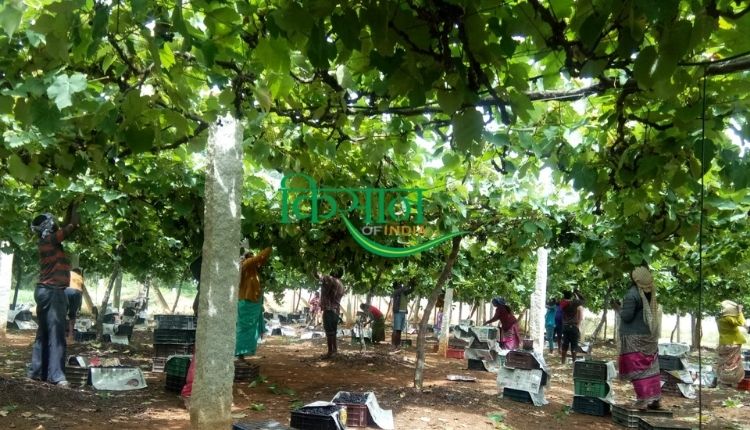
Brand made under the name of ‘Nandi grapes’
Muralidhar then approached the Bangalore-based Department of Agriculture, Marketing and Cooperation, Gandhi Krishi Vigyan Kendra (GKVK). The scientist here Dr. Jayaram advised him to sell grapes under the brand. Following this advice, he created his own brand under the name ‘Nandi grapes’. The name of the brand was suggested to him by Dr. Jayaram, as Murlidhar’s farm is near Nandi Hills.
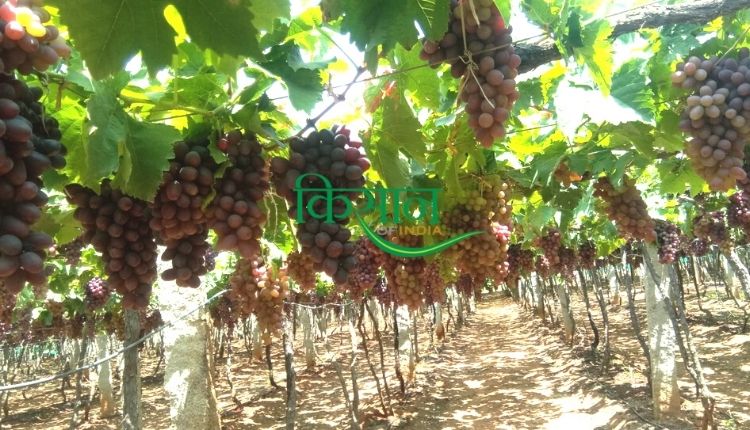
Profits started increasing year after year
He started selling his own brand of grapes from the main premises of GKVK. On the first day, grapes were sold at Rs 30 per kg at a price less than the retail market. The quality of their grapes was so good, they went on becoming customers. Sharad Seedless variety started selling at Rs 70 per kg and Red Globe variety at Rs 80 per kg.
Seeing the increasing demand for grapes, he produced a total of 40 tonnes of grapes in 2017. In 2018, 45 tonnes of grapes were produced from a total land of 3.5 acres. In 2017, Muralidhar earned Rs 22 lakh from direct marketing, with the cost of money between Rs 6.5 to 7 lakh. Similarly, in 2018 he earned 26 lakhs. The scientists advised him to do marketing in important centers like MS Building, Marketing Board and IT companies in Bengaluru.
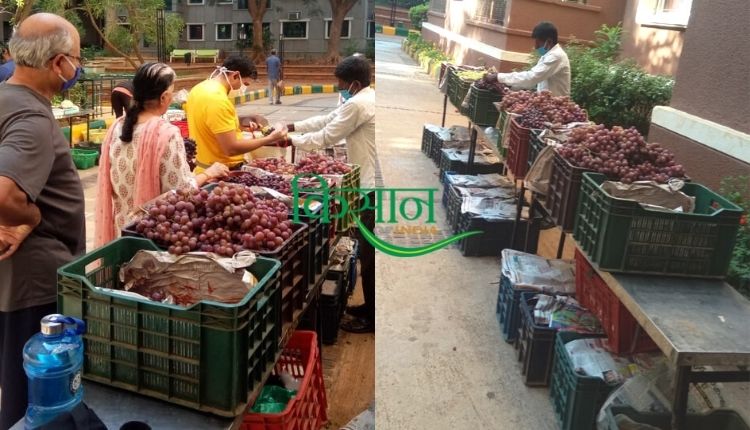
Pomegranate cultivation also started
Besides grapes, in 2016 Muralidhar started cultivating pomegranate in an area of 2 acres. He planted thousand saplings of saffron variety of pomegranate. In 2017, he got a yield of 12 tonnes from it, earning him Rs 6 lakh. Muralidhar’s marketing strategy is to sell his produce at Rs 30-40 less than the retail price at different locations in Bangalore. Muralidhar told that the price at which he gives produce to the customers is economical.
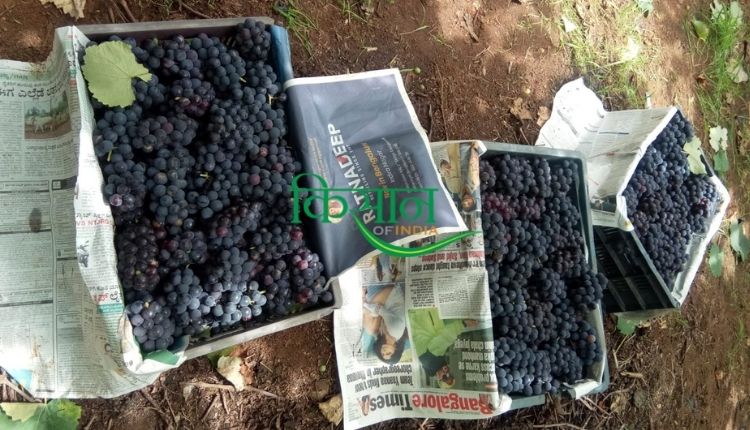
Technology linked to agriculture
Muralidhar plows his field using power tiller. Machines are used for spraying and other farming related works. Farming is done by drip irrigation technology. Fertilizers are mixed with irrigation water and delivered directly to the plants through drippers with the help of equipment.
In pomegranate cultivation, he regularly sprays Arka Microbial Consortium to manage soil borne wilt and bacterial blight. In addition, Trichoderma, Arka Microbial Consortium and Biofertilizers are also used on their crops. His farm has a vermi-compost unit and a pond with a capacity of 6 lakh litres of water. He has also adopted all the techniques of water conservation throughout the year. Due to his continuous efforts and progress in scientific and modern farming, he got the award of best horticulture farmer of the district in 2016-17 from the University of Horticulture Science, Bagalkot.
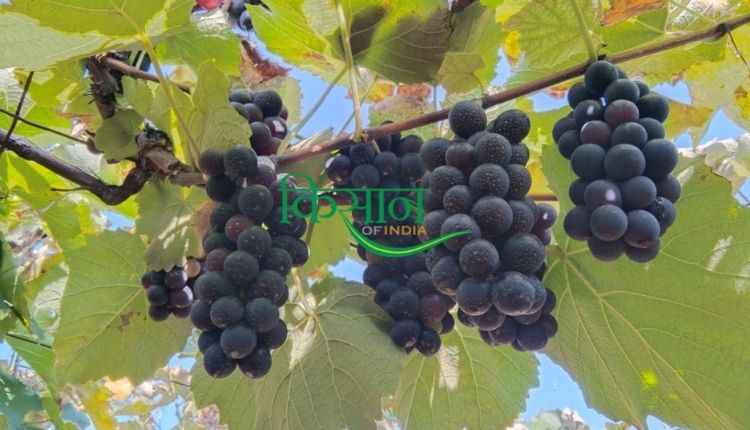
Characteristics of grape varieties
Red Globe Variety: Fruits are round in appearance and 10 to 16 grams in weight. The colour of the berries ranges from pale pink to dark pink or brown. The colour depends on the temperature. During storage, the flakes turn black. The size of jamun can reach up to 40 mm and the weight can be more than 20 grams, if good agricultural techniques are adopted keeping in view the characteristics of the variety.
Autumn Seedless: This grape variety is black and purple in colour. Sharad Seedless Grapes are rich in Vitamins A, C and B6. The months of December and February are best for autumn seedless grape cultivation. Due to its taste and nutritive properties, it is also in good demand in the foreign market.
Bangalore Blue Variety: This variety is used for making jams and jellies. The leaves of its plants are small, thin in shape and the fruits are dark purple in colour and oval in appearance. It contains about 16 to 18 percent aromatic TSS. It is also used to make juice and wine.
Contact us: If farmers want to share information or experiences related to farming with us, then they can do this by calling us on the phone number 9599273766 or by writing an email to kisanofindia.mail@gmail.com or by sending your recording. Through Kisan of India, we will convey your message to the people, because we believe that if the farmers are advanced then the country is happy.
You can connect with Kisan of India on Facebook, Twitter, and Whatsapp and Subscribe to our YouTube channel.

